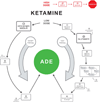Ketamine as a promising prototype for a new generation of rapid-acting antidepressants
- PMID: 25727103
- PMCID: PMC4412785
- DOI: 10.1111/nyas.12718
Ketamine as a promising prototype for a new generation of rapid-acting antidepressants
Abstract
The discovery of ketamine's rapid and robust antidepressant effects opened a window into a new generation of antidepressants. Multiple controlled trials and open-label studies have demonstrated these effects across a variety of patient populations known to often achieve little to no response from traditional antidepressants. Ketamine has been generally well tolerated across patient groups, with transient mild-to-moderate adverse effects during infusion. However, the optimal dosing and route of administration and the safety of chronic treatment are not fully known. This review summarizes the clinical effects of ketamine and its neurobiological underpinnings and mechanisms of action, which may provide insight into the neurobiology of depression, relevant biomarkers, and treatment _targets. Moreover, we offer suggestions for future research that may continue to advance the field forward and ultimately improve the psychopharmacologic interventions available for those individuals struggling with depressive and trauma-related disorders.
Keywords: antidepressant; depression; ketamine; neurobiology; treatment mechanisms.
Published 2015. This article is U.S. Government work and is in the public domain in the USA.
Conflict of interest statement
Dr. Averill declares no conflicts of interest.
Figures


Similar articles
-
Ketamine and rapid-acting antidepressants: a window into a new neurobiology for mood disorder therapeutics.Annu Rev Med. 2015;66:509-23. doi: 10.1146/annurev-med-053013-062946. Epub 2014 Oct 17. Annu Rev Med. 2015. PMID: 25341010 Free PMC article. Review.
-
What is the mechanism of Ketamine's rapid-onset antidepressant effect? A concise overview of the surprisingly large number of possibilities.J Clin Pharm Ther. 2017 Apr;42(2):147-154. doi: 10.1111/jcpt.12497. Epub 2017 Jan 22. J Clin Pharm Ther. 2017. PMID: 28111761 Review.
-
Ketamine: A Paradigm Shift for Depression Research and Treatment.Neuron. 2019 Mar 6;101(5):774-778. doi: 10.1016/j.neuron.2019.02.005. Neuron. 2019. PMID: 30844397 Free PMC article. Review.
-
[Ketamine--a new treatment option for therapy-resistant depression].Fortschr Neurol Psychiatr. 2015 Feb;83(2):91-7. doi: 10.1055/s-0034-1398967. Epub 2015 Feb 27. Fortschr Neurol Psychiatr. 2015. PMID: 25723773 Review. German.
-
[Ketamine for treatment of acute depression].Ugeskr Laeger. 2013 Sep 9;175(37):2090-3. Ugeskr Laeger. 2013. PMID: 24011203 Review. Danish.
Cited by
-
Effect of low-dose ketamine on PerioperAtive depreSsive Symptoms in patients undergoing Intracranial tumOr resectioN (PASSION): study protocol for a randomized controlled trial.Trials. 2018 Aug 29;19(1):463. doi: 10.1186/s13063-018-2831-0. Trials. 2018. PMID: 30157913 Free PMC article.
-
Memantine and Ketamine Differentially Alter NMDA Receptor Desensitization.J Neurosci. 2017 Oct 4;37(40):9686-9704. doi: 10.1523/JNEUROSCI.1173-17.2017. Epub 2017 Sep 6. J Neurosci. 2017. PMID: 28877967 Free PMC article.
-
Experimental medication treatment approaches for depression.Transl Psychiatry. 2017 Mar 21;7(3):e1068. doi: 10.1038/tp.2017.33. Transl Psychiatry. 2017. PMID: 28323287 Free PMC article. Review.
-
Negative Allosteric Modulators Selective for The NR2B Subtype of The NMDA Receptor Impair Cognition in Multiple Domains.Neuropsychopharmacology. 2016 Jan;41(2):568-77. doi: 10.1038/npp.2015.184. Epub 2015 Jun 24. Neuropsychopharmacology. 2016. PMID: 26105137 Free PMC article.
-
Immunopharmacological considerations of general anaesthetics for surgical procedures in the times of COVID-19: Correspondence.Ann Med Surg (Lond). 2023 Apr 6;85(5):2232-2236. doi: 10.1097/MS9.0000000000000555. eCollection 2023 May. Ann Med Surg (Lond). 2023. PMID: 37228990 Free PMC article. No abstract available.
References
-
- Kessler RC, et al. The epidemiology of major depressive disorder: results from the National Comorbidity Survey Replication (NCS-R) JAMA : the journal of the American Medical Association. 2003;289:3095–3105. - PubMed
-
- Rush AJ, et al. Acute and longer-term outcomes in depressed outpatients requiring one or several treatment steps: a STAR*D report. The American journal of psychiatry. 2006;163:1905–1917. - PubMed
-
- Katz MM, et al. Onset and early behavioral effects of pharmacologically different antidepressants and placebo in depression. Neuropsychopharmacology : official publication of the American College of Neuropsychopharmacology. 2004;29:566–579. - PubMed
-
- Gaynes BN, et al. What did STAR*D teach us? Results from a large-scale, practical, clinical trial for patients with depression. Psychiatric services (Washington, D.C.) 2009;60:1439–1445. - PubMed
Publication types
MeSH terms
Substances
Grants and funding
LinkOut - more resources
Full Text Sources
Other Literature Sources
Medical

